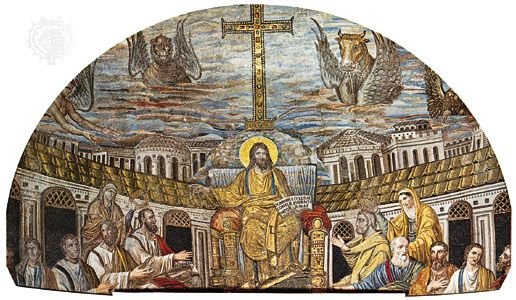The Book of Revelation is the final book of the New Testament in the Bible. It is a highly symbolic and apocalyptic text that has captivated readers for centuries. It is also known as the Apocalypse of John, as it is traditionally believed to have been written by the apostle John while he was exiled on the island of Patmos. The book presents a series of visions and prophecies that depict the end times and the ultimate victory of good over evil.
One of the key features of Revelation is its use of **apocalyptic literature**, a genre that was popular during the time it was written. Apocalyptic literature often includes visions, dreams, and symbolic language to convey a message about the future and the spiritual realm. In the case of Revelation, the author uses these literary devices to reveal God’s plan for the world and to encourage believers to remain faithful in the face of persecution and hardship.
The Authorship of Revelation
The authorship of the Book of Revelation has been a topic of debate among scholars throughout history. While tradition attributes its authorship to the apostle John, some scholars argue that it was written by a different John or even by multiple authors. The book itself does not explicitly state the author’s identity, referring to the author simply as “John.” However, the author claims to be a witness of Jesus Christ and a fellow partaker in the tribulation.
**Early Christian tradition** strongly supports the apostle John as the author of Revelation. It is believed that John wrote the book during his exile on the island of Patmos in the late first century. According to tradition, John was banished to Patmos by the Roman authorities for his Christian faith. During his time on the island, John received a series of visions and revelations from Jesus Christ, which he recorded in the Book of Revelation.
Despite the debates surrounding authorship, the Book of Revelation has been widely accepted as canonical by most Christian denominations. Its inclusion in the New Testament canon reflects its significance as a prophetic and eschatological text that provides insights into the divine plan for the world.
The Significance of Revelation
**Revelation** holds a special place in Christian theology due to its profound teachings about the end times and the ultimate victory of Christ. It offers hope and encouragement to believers facing persecution and adversity, reminding them that God is in control and that His purposes will ultimately prevail.
The book presents a series of **seven letters** addressed to seven churches in Asia Minor, which serve as both warnings and exhortations to the early Christian communities. These letters highlight the importance of faithfulness, perseverance, and repentance in the face of challenges and temptations.
Furthermore, Revelation unveils a grand vision of the **heavenly worship** and the eternal reign of God. It depicts the triumph of Christ over evil, the defeat of Satan, and the establishment of a new heaven and earth. The book’s powerful imagery and symbolic language inspire awe and reverence, inviting readers to contemplate the divine mysteries and the ultimate destiny of humanity.
Conclusion
In conclusion, the Book of Revelation is a highly symbolic and apocalyptic text that holds immense significance in Christian theology. It offers a unique perspective on the end times and provides encouragement to believers in the face of adversity. While the authorship of Revelation may be debated, its powerful symbolism and visionary language continue to captivate readers and inspire contemplation about the divine plan for humanity.

Authorship of Revelation
The traditional belief is that the Apostle John, one of the twelve disciples of Jesus, wrote the Book of Revelation. However, there is some debate among scholars regarding its authorship.
**The belief in John’s authorship** stems from the early Christian tradition and the internal evidence found within the book itself. In Revelation 1:1, it is stated that the book was “the revelation of Jesus Christ, which God gave him to show his servants what must soon take place.” This suggests that the author was someone who had a close relationship with Jesus, and John fits this description as one of his closest disciples.
**External evidence** also supports John’s authorship. Early second-century Christian writers such as Justin Martyr, Irenaeus, and Clement of Alexandria all attributed the book to John. Additionally, the Muratorian Canon, a document from the late second century that lists the accepted books of the New Testament, includes Revelation as being written by John.
**However, not all scholars agree** with the traditional view. Some argue that the language and style of Revelation differ significantly from the Gospel of John and the Epistles attributed to him. They suggest that it could have been written by a different John, or even by an unknown author using John’s name for authority.
**Another theory** proposes that the book was written by a group of early Christians rather than a single author. This theory suggests that the book was a product of the early Christian community’s collective efforts to express their beliefs and experiences in the face of persecution and societal challenges.
**Nevertheless**, the question of authorship remains a topic of ongoing scholarly discussion and speculation. While the traditional view attributes the Book of Revelation to the Apostle John, alternative theories have emerged, challenging this belief and raising intriguing questions about the book’s origins and its message.
Historical Context
The Book of Revelation was likely written during the reign of the Roman Emperor Domitian, around the end of the 1st century AD. Domitian was known for his persecution of Christians, which likely influenced the themes of persecution and resistance found in the book.
**During Domitian’s rule,** the early Christian community faced intense persecution. **Christians were often arrested, imprisoned, and even executed for their faith**. This hostile environment shaped the experiences of the author and the intended audience of the Book of Revelation. The book’s vivid descriptions of suffering and martyrdom reflect the challenges faced by early Christians under Domitian’s oppressive regime.
**The author of Revelation**, traditionally believed to be the Apostle John, wrote the book while exiled on the island of Patmos. **The purpose of the book** was to provide encouragement, hope, and reassurance to the persecuted Christian community. **Through apocalyptic imagery and symbolism**, the author conveyed a message of divine judgment on the oppressors and the ultimate victory of God’s kingdom.
**Revelation is filled with literary and historical allusions** that would have been familiar to its original audience. **The use of symbolism and numerology** reflects the style of apocalyptic literature popular during that time. The book draws heavily on the imagery and themes from the Hebrew Bible, especially the prophetic writings of Daniel and Ezekiel.
**It is worth noting that the author’s identity** is not definitively established, and **scholars have debated its attribution to the Apostle John**. Some propose alternative theories, suggesting that the book may have been written by a different John or another early Christian figure. However, the traditional belief in John’s authorship has persisted throughout history.

**Understanding the historical context** in which the Book of Revelation was written is crucial for interpreting its message. By recognizing the political and social realities of the time, we gain insights into the author’s intentions and the challenges faced by the early Christian community.
Apocalyptic Literature and the Book of Revelation
Revelation is considered apocalyptic literature, a genre that was popular during times of crisis and persecution. This genre emerged during periods of intense social, political, or religious upheaval, when communities sought hope and reassurance in the face of adversity. Apocalyptic writings often conveyed messages of divine intervention, justice, and the ultimate triumph of good over evil.
The Book of Revelation, also known as the Apocalypse of John, is the final book of the New Testament. It was written by the Apostle John, who is traditionally believed to be the same John credited with authorship of the Gospel of John. The precise date of its composition is a subject of scholarly debate, but it is generally agreed that it was written during the reign of the Roman Emperor Domitian, around the end of the 1st century AD.
During this time, Domitian was known for his persecution of Christians, which likely influenced the themes of persecution and resistance found in the book. The Book of Revelation serves as a source of inspiration and encouragement for believers who faced intense persecution and hardship.
The book employs vivid imagery, symbols, and allegory to convey its message of hope and divine intervention. It draws heavily from the Old Testament prophetic tradition and incorporates elements of Jewish apocalyptic literature. The author uses fantastical visions, angelic beings, and supernatural events to reveal the cosmic struggle between good and evil, the impending judgment of God, and the ultimate victory of Christ.
The Symbolism of the Book of Revelation
The Book of Revelation is filled with rich symbolism that requires careful interpretation. The author uses symbols to convey profound spiritual truths and to communicate messages that were often veiled to those outside the community of believers.
One of the most iconic symbols in Revelation is the number seven, which represents completeness or perfection. The book is structured around a series of sevens, including seven churches, seven seals, seven trumpets, and seven bowls. Each of these sevens reveals a different aspect of the unfolding divine plan.
Another prominent symbol in Revelation is the image of the Lamb, representing Jesus Christ. The Lamb is depicted as the only one worthy to open the seals that unleash the judgments of God upon the earth. This symbolizes Jesus‘ sacrificial death and resurrection, and his ultimate authority over all things.
The Themes of Judgment and Renewal
Revelation emphasizes the themes of judgment and renewal. It portrays God’s righteous judgment upon the powers of evil and oppression, as well as his ultimate victory over them. The book also offers hope for renewal and restoration, presenting a vision of a new heaven and a new earth where God’s kingdom reigns supreme.
Throughout the book, there are vivid descriptions of cosmic battles, cataclysmic events, and the downfall of oppressive powers. These images serve to instill hope and courage in the hearts of believers, reminding them that God is in control and will bring about justice in the end.
While the apocalyptic genre can be complex and challenging to interpret, the Book of Revelation continues to resonate with readers throughout the centuries. Its messages of hope, endurance, and the ultimate triumph of good over evil have provided comfort and inspiration to countless individuals facing their own personal trials and tribulations.
Key Themes
The Book of Revelation addresses several key themes, each providing profound insights into the nature of God’s plan for humanity and the ultimate destiny of the world. These themes include:
- The sovereignty of God: Revelation emphasizes the absolute power and authority of God over all creation. It reveals God as the supreme ruler who orchestrates events according to His divine plan.
- The conflict between good and evil: The book portrays an intense spiritual battle between the forces of good, represented by God and His faithful followers, and the forces of evil, symbolized by Satan and his allies. This conflict underscores the ongoing struggle between righteousness and wickedness.
- The final judgment: Revelation depicts the final judgment when God will hold all accountable for their actions. It portrays a scene of divine justice, where the righteous are rewarded with eternal life in God’s presence, and the wicked face eternal punishment.
- The hope of a new heaven and earth: The book offers a vision of the future where God will create a new heaven and earth, free from sin, suffering, and death. This vision provides hope and encouragement to believers, reminding them of the ultimate triumph of God’s kingdom.
Revelation’s exploration of these themes offers profound insights into the nature of God, the human condition, and the ultimate destiny of the world. Its vivid imagery and symbolic language captivate readers, inviting them to consider the eternal truths it conveys.
Throughout the book, various symbols and metaphors are used to convey these themes. For instance, the image of the Lamb symbolizes Jesus Christ, who sacrificially gave His life for the salvation of humanity. The number seven, often repeated throughout Revelation, represents completeness and perfection. The use of angels, trumpets, seals, and bowls adds to the dramatic and apocalyptic nature of the text.
Revelation also offers glimpses into heavenly worship and the praise that resounds before the throne of God. These scenes depict a grand celebration of God’s glory and power, with angels, elders, and redeemed believers joining in worship. These glimpses into heavenly worship remind readers of the eternal glory and joy that await those who remain faithful to God.

Interpretations of Revelation
Throughout history, there have been various interpretations of the Book of Revelation. Some view it as a literal prophecy of future events, while others see it as a symbolic depiction of the ongoing struggle between good and evil.
**One of the key debates surrounding the interpretation of Revelation centers on the question of whether the events described are to be understood as literal or symbolic.** Those who take a literal approach believe that the book contains prophecies about the end times, with each event unfolding as described. They see the book as a roadmap to future events, including the rise of the Antichrist, the Battle of Armageddon, and the Second Coming of Christ.
**On the other hand, those who adopt a symbolic interpretation view the book as an allegory or metaphorical depiction of the ongoing spiritual battle between good and evil.** They believe that the book uses vivid imagery and symbolic language to convey spiritual truths and lessons, rather than predicting specific future events. According to this perspective, the beasts and dragons mentioned in Revelation represent evil forces, while the victory of the Lamb represents the triumph of good over evil.
**Another area of interpretation revolves around the identification of key figures and symbols in the book.** For example, the identity of the Antichrist mentioned in Revelation has been the subject of much speculation and debate. Throughout history, various individuals and groups have been identified as potential candidates, ranging from political leaders to religious figures.
**The interpretation of specific symbols and numbers in Revelation also varies among scholars and theologians.** For instance, the number 666 mentioned in Revelation has been associated with different historical figures and events, leading to a wide range of interpretations. Some see it as a reference to the Roman Emperor Nero, while others believe it symbolizes the corruption and imperfection of human systems.
**It is important to note that the Book of Revelation is highly symbolic and written in a complex apocalyptic genre. As such, it requires careful study and interpretation to grasp its intended meaning.** Scholars and theologians approach the book with different hermeneutical frameworks, seeking to understand its historical context, literary devices, and theological themes.
**Regardless of the differing interpretations, the Book of Revelation continues to captivate and inspire readers with its powerful imagery, vivid descriptions, and messages of hope and redemption.** It serves as a reminder of the ultimate victory of good over evil and the promise of a new heaven and earth where God’s reign is fully realized.
Relevance Today
The Book of Revelation continues to be studied and debated by scholars and theologians, making it a significant and enduring text in the realm of biblical studies. Its profound themes and vivid imagery captivate readers, offering insights into the nature of evil, the perseverance of faith in times of persecution, and the hope of a future redeemed by God’s power.
The nature of evil: Revelation delves into the concept of evil in a unique and compelling way. It portrays evil as a force that seeks to corrupt and destroy, represented by the figure of the dragon and its allies. This imagery serves as a powerful reminder of the ongoing battle between good and evil in the world and serves as a call to resist evil and remain steadfast in faith.
Perseverance in times of persecution: The Book of Revelation offers encouragement and hope to believers facing persecution or adversity. It depicts the faithful as enduring trials and tribulations but ultimately triumphing over evil through their unwavering faith in God. This message resonates with individuals facing challenges in their own lives, reminding them to remain steadfast and trust in God’s ultimate victory.
The hope of a future redeemed by God’s power: One of the central themes of Revelation is the promise of a future in which God’s power brings about redemption and restoration. The book envisions a new heaven and a new earth, where evil is vanquished, and God’s kingdom is fully established. This vision of hope provides solace and reassurance to believers, reminding them that God’s ultimate plan is one of restoration and renewal.

The enduring relevance of the Book of Revelation lies in its ability to speak to the human condition and provide guidance and hope in challenging times. Its timeless message of standing firm in faith, resisting evil, and trusting in God’s ultimate victory continues to resonate with believers today.

Rockin’ the faith, one verse at a time!
Growing up, the Bible’s stories deeply impacted me. Now, with over 15 years of preaching experience, I blend timeless teachings with modern technology, making them relevant for today’s world.
Bible Hub Verse is my platform to share historical insights and thought-provoking articles, exploring both familiar and uncommon Christian topics. My passion is building a welcoming online space for everyone to learn, grow in their faith, and discover the Bible’s enduring message.
Join the journey!
God bless you.






